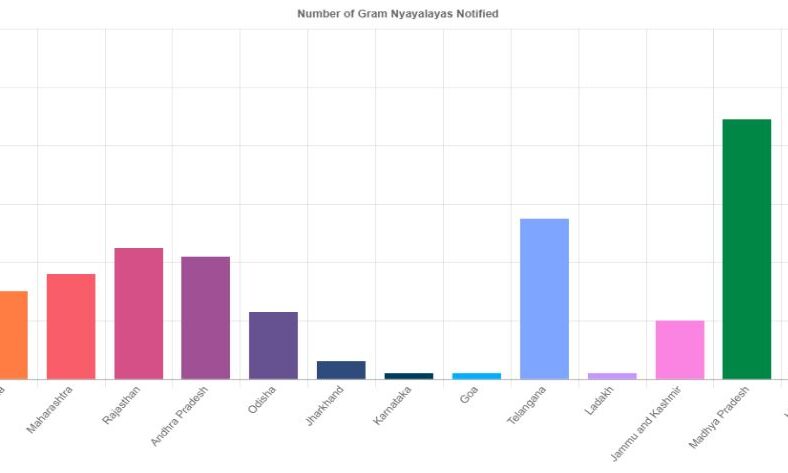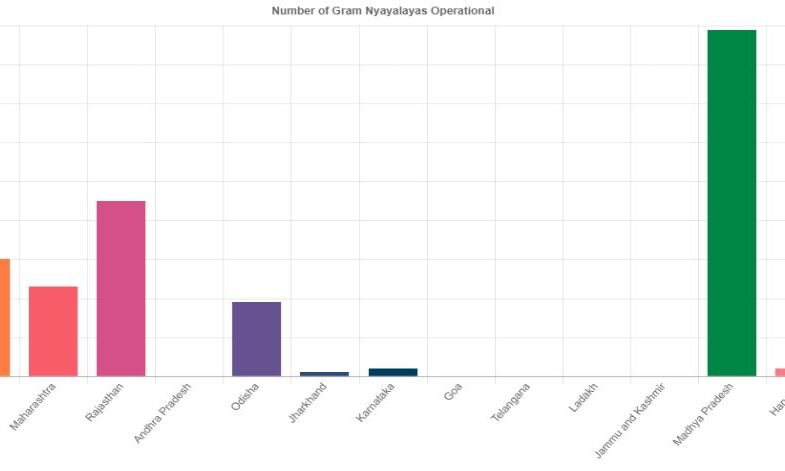People of rural Karnataka have no choice but to travel to courts in the city. The 15-year old Gram Nyayalaya Act remains on paper.
There is not a single gram nyayalaya functioning in Karnataka. Several notifications have been issued by the Supreme Court and the High Court of Karnataka to the state government to establish gram nyayalayas in every gram panchayat. However, the state has failed to establish village courts. Out of 15 states which have notified gram nyayalayas, Karnataka has only two gram nyayalayas for 5659 gram panchayats.
Ninge Gowda, Advisor to the Director of the Department of Panchayti Raj and Rural Development and retired Section officer, said, “The state government has enacted the law, the Gram Nyalyayas Act, 2008. However, not a single gram nyayalaya is functioning in the state. To enact a law is different from implementing it. The issue is at the policy making level. The government is trying to find local professionals who can solve the problems of villagers. Once they are able to find such professionals only then gram nyayalayas can function properly in the state.”
Karnataka formed a committee of high court judges composed of Justices Dinesh Kumar, Prabhakar Shastry, S. Amarannanvar and S. Rachaiah in 2019. The committee was to advise the state government on establishing gram nyayalayas. However, the state government has not taken any steps on the recommendations of the committee. Since the enactment of the Gram Nyayalaya Act in 2008, only two gram nyayalayas have been notified in Karnataka in Hosur and Mandikal hoblis of Gauribidanur and Gudibande taluks of Chikkaballapur district respectively. And, these two are not operational.
Data shown by the Department of Justice states that a total of 33 criminal cases have been registered since 2009. Out of which only one case has been disposed of so far.Also, 68 civil cases have been registered out of which 63 cases are pending. “Technically, Karnataka has zero gram nyayalayas. Even the existing ones are not functioning because of lack of professionals and nyadhikaris presiding judges. Therefore, the efficiency of these gram nyayalayas is negligible. Lower courts perform the work of gram nyayalayas in villages and this increases the workload in lower courts, leading to increasing pendency in cases,” said Ninge Gowda.
Karnataka is one of the states with a higher pendency of cases. Data by the National Judicial Data Grid shows that over one crore civil cases are pending and over three crore criminal cases are pending in the subordinate courts of Karnataka. Over 70 per cent of these have been pending for more than a year. Further, nearly 1.5 lakh criminal cases are pending in subordinate courts for nearly five years.
Panchayats in Bengaluru district say that the state government is not notifying them to establish gram nyayalayas any more.
Mr. Srinivas, Secretary, K. Golahalli Gram Panchayat, said, “We have submitted many applications to the Department of Panchayati Raj and Rural Development to notify Golahalli gram panchayat, but the Department has rejected our applications every time, stating that the department has not sufficient funds.” The data shown by the Secretary of Golahalli Gram Panchayat shows that at least 5,000 cases pending in lower courts involve the villagers of Golahalli.
Kalavati, Member and Former President of Golahalli Gram Panchayat said, “My husband and I are fighting with his brother over a property. First, we took our case to the gram sabha. However, it could not resolve the case and referred the case to the district court. And now six years have passed and no progress has been made in our case. As always, the judge gives us another date to come to the court.” She also said that every time they spend huge money on travelling, so many times they even skip going to the court.
Srinivas, Secretary of Golahalli Gram Panchayat said, “Villagers come and ask the panchayat staff regarding the status of their cases because the panchayat decides to transfer the cases to the courts, if a case cannot be resolved by the gram sabha. And generally these cases are related to property disputes.” He also mentioned that if the state government decides to establish gram nyayalaya, the burden on lower courts can easily be reduced and it will also reduce the workload of the gram panchayat so that they can focus more on development of the area instead of dealing with the personal cases of villagers.”
Dr. Namita Jain, Professor of Law, Rajasthan University said, “Gram nyayalayas are enacted to provide justice at the grassroot level. This was implemented to ensure that the opportunities of justice should not be denied to any citizen due to their social, economic and other disabilities.”She added that he gram nyayalayas are the next best substitute for alternative dispute reconciliation. The judicial system of the country strongly needs gram nyayalayas. This is also because lok adalats, presided over by retired judges havealso failed to provide speedy justice to the people of rural India, she said. She said that lack of professionals is no reason to stop establishing village courts. She pointed out that Karnataka has a higher literacy rate than states like Rajasthan, Madhya Pradesh and Uttar Pradesh who have established gram nyayalayas. “It is
easy to find suitable people and train them for village courts,” she said. However, she added, governments do not do this because they would rather spend the money on projects that can bring them votes. However, this impacts poor people who cannot afford expensive justice in courts.
The objective behind the Gram Nyayalaya Act, 2008 is to provide inexpensive justice to people in rural areas at their doorsteps. However, the state government of Karnataka has not taken any steps in this direction.
JC Madhu Swamy, the Law Minister of Karnataka in an interview with the New Indian Express said that the state government will establish the village courts under the act in a phased manner. Karnataka will then join the list of the states where justice has reached to the grassroot level.







This is shocking and so sad. This is no excuse for a state like Karnataka.